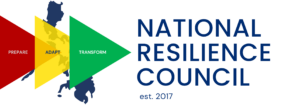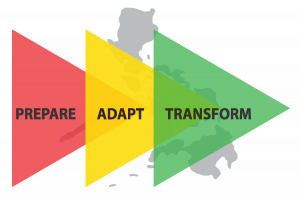The National Resilience Council of the Philippines forged a partnership with the Coastal Cities at Risk in the Philippines Project of the Ateneo de Manila University, Xavier University-Ateneo de Cagayan, and EpiMetrics, Inc. to implement the Web-based Geospatial Risk Database for COVID-19 Pandemic Response and Recovery training program. Its first phase was launched from June 16 to 23, 2020. The training program enhances local decision support systems by providing both temporal and spatial situational awareness. It was designed to advance the continuing professionalization of Philippine local government officials in the area of evidence-informed disaster risk governance.
The Geospatial Risk Database Decision Support System was first developed by Xavier University-Ateneo de Cagayan in close coordination with the Philippine Department of Health Region X to support and inform responses to the COVID-19 pandemic. Being web-based, the geospatial risk information platform may be utilized and updated by team members who are working from different locations. Their basic deliverables include building a shared dashboard that reflects the collection, analyses and visualization of data critical to containment and mitigation.
Other thematic layers may be created to enable greater situational awareness of syndromic data at the household level and pharmaceutical and non-pharmaceutical interventions such as tracking the status of cases, the distribution of food relief packages, and the delivery of financial assistance under the Philippine Social Amelioration Program.
This spatio-temporal approach to mapping COVID-19 is an innovation that facilitates a shared awareness of natural and biological hazards, exposure, and vulnerability. It enables a systems approach to analyzing disaster risk which may then inform local climate and disaster risk assessments. A greater understanding of the complexities of COVID-19 may then facilitate the inclusion of pandemic prevention and response in future investments in medium and long-term resilience.
Program participants include the cities of Cagayan de Oro, Iloilo, Muntinlupa, Naga, Ormoc, and Zamboanga, and their respective academic partners in the NRC Resilient LGU Systems Program, namely: Xavier University-Ateneo de Cagayan, University of the Philippines-Visayas, Pamantasan ng Lungsod ng Muntinlupa, Ateneo de Naga University, Visayas State University, and Ateneo de Zamboanga. Local government teams included officers of the City Planning Development Office, Health Office, and Disaster Risk Reduction and Management Office.
During the closing session of the 6-day training program, city teams presented their initial project outputs which consisted of a preliminary dashboard, ArcGIS StoryMaps, and their work plan for the full development of their COVID-19 Web-based Geospatial Risk Database.
For more information about this program and other NRC initiatives, please email [email protected] or visit www.resiliencecouncil.ph.

![]()


